Alabama Boat Bill of Sale Form
In Alabama, a boat bill of sale is a critical document that sellers must use during a sale transaction. It is legally binding and both parties must sign and agree on the terms of the sale agreement. The vessel bill of sale provides evidence of the transaction at a particular date, the parties involved, notary information, the purchase price, and all relevant details that display the transfer of ownership. It prevents fraudulent transactions from dishonest sellers who may want to carry out illegal deals.
The bill of sale is mandatory in Alabama since it is one of the requirements during the registration process. It is vital to use a bill of sale template when selling or purchasing a vessel for record-keeping and titling purposes. Read here to learn what other transactions might require a bill of sale.
Alabama bill of sale templates – know more about bills of sale that can be used for other things in the State of Alabama.
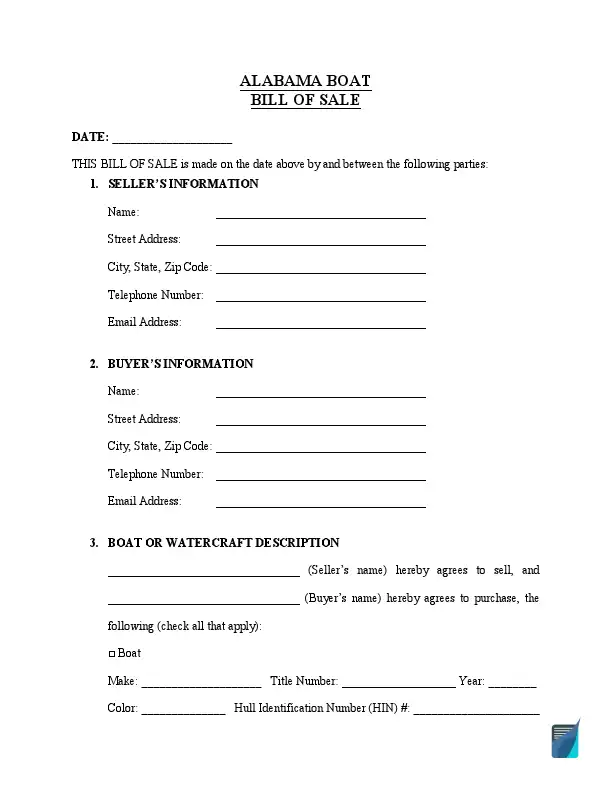
Build Your Document
Answer a few simple questions to make your document in minutes
Save and Print
Save progress and finish on any device, download and print anytime
Sign and Use
Your valid, lawyer-approved document is ready
Registering a Boat in Alabama
After purchasing your vessel and finalizing the sale deal, it is now time to register it in your name. It is imperative to note that if your boat is new, the deadline for registering is three days, while a used boat is fifteen days, meaning that you have to register within those days after purchasing the vessel. Boat owners who may want to renew can complete the registration online at the Alabama Law Enforcement website.
The watercraft seller in the bill of sale must alert the Marine Patrol Division in Alabama of the transfer of ownership within 15 days.
If you are registering your new vessel for the first time, you must physically go to your Local County Probate Office within the three days after buying the watercraft. Here, you must fill out a boat application form, which covers registration, transfer, or replacement. In this case, you will choose the new registration option. You must also provide a complete vessel bill of sale form, which the Probate office will use to extract information from both parties for a correct registration.
Below are the details to be included in the application form:
- Owner’s particulars: name, address, telephone number, date of birth, social security number, city, state, and zip
- Transfer details: previous owner, address, registration date
- Boat description: registration number, make, year, length, hull identification number, horsepower, engine, and serial number. Other details include hull material, propulsion, use, fuel, vessel type, and if it is a marine sanitation device.
After completing the application form, the purchaser must pay for the registration fee. The cost is dependent on the class size of the boat. Boats are typically categorized into four classes, each with a different length. Below is a snippet of the cost per class if you register for the first time or renew:
| Class | Cost | Issuance Fee |
| I | $18 | $2 |
| II | $23 | $2 |
| III | $73 | $2 |
| IV | $98 | $2 |
| V | $23 | $2 |
If you are transferring ownership of a used boat, you will pay $3 and an additional $2 issuance fee.
Once you provide the documents to the Probate Office and pay the required fees, the officers will process your new title and finalize the watercraft registration.
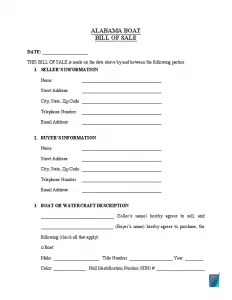
How to write Alabama Boat Bill of Sale
The filling guide was written around the bill of sale form created by us. But, should there be a document provided by your local authorities, it is always recommended to use it during the deal.
Step 1: Specify when the document is created and filled out.

Step 2: Enter the seller’s and purchaser’s particulars:
- Full legal name
- Address: Street, City of residence, State, Zipcode
- Contact details: Phone, Valid email address

Step 3: Fill out the details concerning the boat you are selling:
- Manufacturer
- Title number
- Model year
- Distance traveled (odometer reading)
- Color
- Hull Identification Number (HIN)
- Trailer and motor details (if any)
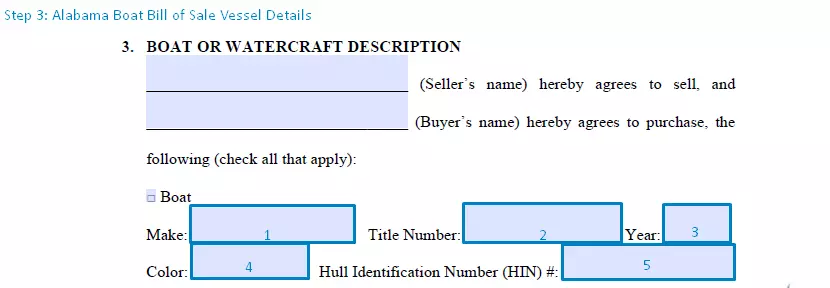
Step 4: Select the way the buyer will pay for the car and for what amount of money.
This stage also requires indicating the exact date of the purchase and the full amount approved by both parties of the transfer. As soon as that has been done, you should specify the method of purchase:
- One-time payment. Absolutely nothing hard here: the property owner is given the full amount from the buyer in one transaction and presents the boat to the purchaser within the same day.
- Installments. Indicate the downpayment amount and the date when it should be given, including the date by which the entire sum must be transferred to the seller.
Next, choose one payment method:
- Cash
- Check
- Cashier’s check
- Money order
As a final point, check if the purchase amount contains all applicable taxes.
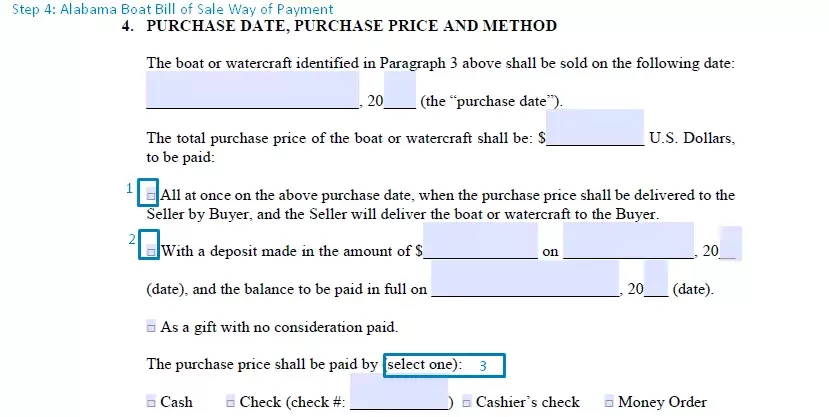
Step 5: Read through standard provisions and make sure that all parties are aware of them.
This section generally contains the “as-is” provision that implies the object is sold with no warranty.
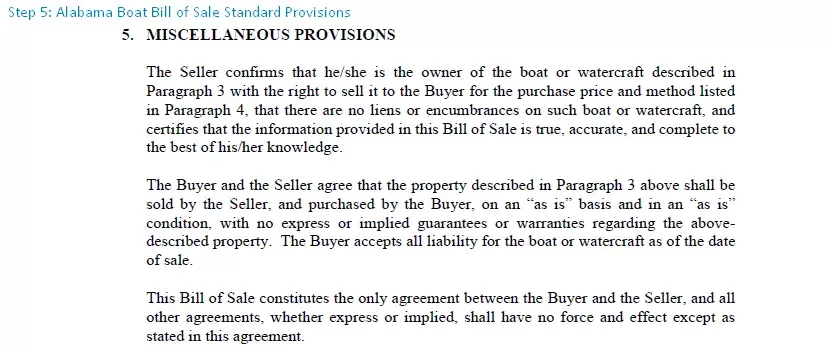
Step 6: Sign the bill of sale.
In most states, the signature of the buyer is not required. But, you are more protected from legal problems if all sides sign the bill of sale form. As an insurance policy, the buyer and seller can find somebody who can attest the transaction and sign the form as well.
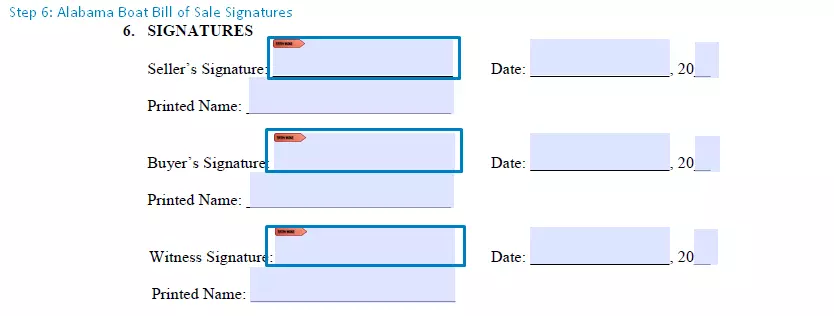
Step 7: Use the services of a notary public
Even though notarization is almost never necessary, it functions as another way to shield against legal troubles.
The original document copy has to be given to the buyer since they will need it to acquire a title to their newly bought boat. As a seller, you can either create a copy and keep it or have a pair of identical forms signed and filled out by both parties.
